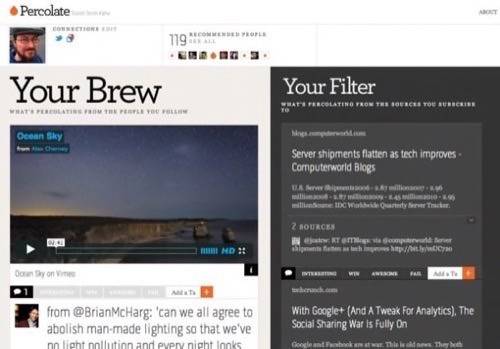James Gross and Noah Brier have talked to a lot of people at a lot of different companies around the world and they say the number one most-asked question by corporate execs about to jump into social media is almost always “but what should I Tweet about?”

The blank white box, as Gross and Brier refer to the interface presented by almost all other social media publishing tools, is a path to writer’s block or ineffective self-promotion for most corporate participants in online social media. These two experienced practitioners from the advertising and marketing world have now launched a much-anticipated new service called Percolate that aims to give people something to talk about. They’ve quickly built up a small customer base, have bootstrapped a team of 7 employees and this week they are opening the service to the world. The first 300 ReadWriteWeb readers to visit the site through this link can access Percolate right away.
Percolate reminds me of a philosophy I’ve long advocated about blogging: inhale feeds and exhale blog posts. Alongside that philosophy is a belief that the best way to grow your brand is by adding value to conversations of general interest online. Your conversion rate with regard to your marketing goals may be lower than it would be if you were just talking about yourself all the time, but by emphasizing the value you add and your pass-along value, then the total number of people you’ll reach and hopefully your total number of conversions will be much higher.
Bare-knuckle RSS and blogging fans have been doing that for years, but much of the rest of the world could use some smart, attractive technology that lightens the load and makes content production even easier and more efficient.
Percolate presents something like a personalized Techmeme of topic content on the right hand side of the page (it cross-references news updates from millions of feeds with your personal network of trusted Twitter contacts and your demonstrated history of topic and source interest), and a stream of your contacts’ feedback on news on the left. You’re then encouraged to jump into either of those streams and offer feedback on any existing news item that’s as short as a one word tag or as long as a full blog post.

“What people are really doing on Twitter is not saying I’m having lunch with my cat,” says Gross.
“What they are doing is contextualizing links all day. We don’t think that filtering for the best links is a product, though, we think it’s a feature. The value is created when you can get users to trust your platform for both consumption and publishing. The real breakthrough over the last year was Tumblr and Twitter, the way they created the read/write interface where you created and consumed in the same environment, in that dashboard-like flow.”
Gross says the first few customers who are licensing Percolate’s technology as a back end and publishing to their own website front ends are aiming to have their team members post 20 to 30 short responses to links of interest each day – rather than struggling to write 1 to 3 medium to full-length blog posts each day from a cold start.
Future iterations of the publishing tool will be focused on grabbing media assets and pull-quotes from the pages that Percolate users are commenting on. That will make it all the faster and easier to create rich blog posts throughout each day.
How Well Does it Work?
I buy this idea, I really do. The service is available for free to consumers and charges for API access by brands. The interface has a couple of bugs at launch, but Gross (who worked at RWW ad network partner Federated Media previously) and co-founder Noah Brier, who has been a well-known online media consultant to leading brands around the world for many years, are very capable people and will likely iron out any kinks in the system soon.
I’m not sure how well the stories surfaced will prompt responses from users. That will be a big challenge to get right and it will require some training by users.
Users will likely find pleasing the inline publishing of responses to links as the core experience on the platform. Gross says his company watches Tumblr closely (who doesn’t in the publishing world?) and I can imagine people seeing Percolate as a Tumblr for brands or for responses to out-of-network content.
What do you think, would-be bloggers? Does this seem like something that could help you publish more and better content online?










